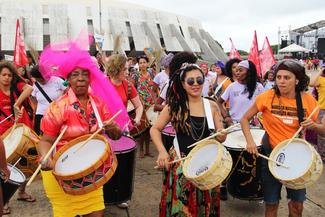- ImpactWe help parliaments to become greener and to implement the Paris agreement.We support democracy by strengthening parliamentsWe work to increase women’s representation in parliament and empower women MPs.We defend the human rights of parliamentarians and help them uphold the rights of all.We help parliaments fight terrorism, cyber warfare and the proliferation of weapons of mass destruction.We encourage youth participation in parliaments and empower young MPs.We support parliaments in implementing the SDGs with a particular focus on health and climate change.
- ParliamentsNearly every country in the world has some form of parliament. Parliamentary systems fall into two categories: bicameral and unicameral. Out of 190 national parliaments in the world, 78 are bicameral (156 chambers) and 112 are unicameral, making a total of 268 chambers of parliament with some 44,000 members of parliament. IPU membership is made up of 180 national parliaments
Find a national parliament
We help strengthen parliaments to make them more representative and effective. - EventsVirtual eventThe International Court of Justice (ICJ) was constituted under the United Nations Charter to help nations settle disputes peacefully in accordance with international law.
- Knowledge
Discover the IPU's resources
Our library of essential resources for parliamentsGlobal data for and about national parliamentsLatest data and reports about women in parliamentResolutions, declarations and outcomes adopted by IPU MembersRecent innovations in the way parliaments workThe latest climate change legislation from the London School of Economics' database
Eliminating discrimination - Working with CEDAW
Parliaments play a key role in ensuring that UN mechanisms are respected and implemented at the national level.
The UN Committee on the Elimination of Discrimination against Women (the CEDAW Committee) monitors how far countries are complying with the UN Convention on the Elimination of All Forms of Discrimination (CEDAW).
The Convention sets out a comprehensive framework for women’s rights and gender equality. When a country signs up, it legally commits to taking specific measures such as incorporating the principle of gender equality into the legal system; abolishing discriminatory laws; and adopting measures to promote gender equality in all areas of life.
Countries that have ratified the Convention must conduct internal reviews and submit a report to the Committee at least every four years.
IPU and CEDAW
The IPU works with the CEDAW Committee to encourage parliaments to participate actively in preparing and presenting reports. The Committee is the only UN treaty body to have adopted a policy on cooperation with parliaments and with IPU.
During Committee sessions, countries are systematically asked about parliamentary involvement in the reporting process. The Committee also requests that its conclusions be presented to parliaments.
The CEDAW convention itself has been mainstreamed into IPU debates and activities on gender equality, human rights and development.
We also highlight CEDAW’s relevance to other international commitments, such as Sustainable Development Goal 5, UN Security Council resolution 1325 on Women, Peace and Security, and human rights procedures such as the universal periodic review of the UN Human Rights Council.
MPs can play an active role in ensuring that national laws, policies, and budgets reflect the principles and obligations in the Convention.
We also encourage MPs to use their oversight powers to ensure that governments meet their commitments to the Convention.
Some countries register reservations when adopting the Convention on the grounds that certain provisions may be at odds with their own cultures or traditions. This is sometimes allowed to give countries time to fully align their national laws and practices with the Convention.
We work with parliaments to reassess the relevance of these reservations and ensure that the reforms needed are put in place.





